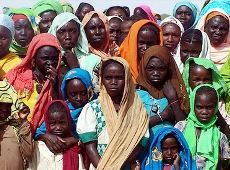Arab call for UN delay on Darfur puzzles key envoy
Aug 21, 2006 (UNITED NATIONS) — A key U.N. Security Council member said on Monday he was puzzled by an Arab League request for an indefinite delay in a planned council meeting on the crisis in Darfur.
 Ghanaian U.N. ambassador Nana Effah-Apenteng, the Security Council president for August, said he got a positive response when he asked the Arab League about the meeting last week.
Ghanaian U.N. ambassador Nana Effah-Apenteng, the Security Council president for August, said he got a positive response when he asked the Arab League about the meeting last week.
“The initial response I had from the Arab League was that they were positive with respect to such a meeting. So if we do schedule the meeting, I expect the Arab League to participate,” Effah-Apenteng said.
The Sudanese government, African Union and Organization of the Islamic Conference were also approached about the meeting, tentatively set for next Monday and intended to explore the way ahead in Sudan’s war-torn Darfur region, he said.
Tens of thousands of people have died in the violence in Darfur that erupted in early 2003 when mostly non-Arab rebels, complaining of neglect, rose up against the Arab-dominated Khartoum government.
Sudan retaliated by arming mainly Arab militia, known as Janjaweed, who began a campaign of rape, plunder and murder that has driven some 2.5 million people from their homes. A recent peace deal has failed to improve the situation.
With U.N. officials warning of a deteriorating humanitarian situation, the United States and Britain want the council to quickly adopt a resolution clearing the way for the 7,000-strong African Union force now serving in Darfur to be replaced by a bigger and better equipped U.N. force.
But the Arab-dominated Sudanese government has so far refused to accept a U.N. force, and Arab League foreign ministers meeting in Cairo asked the council on Sunday to postpone its planned meeting even before it was made public.
Sudanese Foreign Minister Lam Akol called on Arab nations to instead support a Sudanese plan, under which the Khartoum government would send 10,500 new government troops to Darfur.
New York-based Human Rights Watch has dismissed that plan as a way to avert the deployment of U.N. peacekeepers.
(Reuters)
